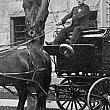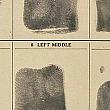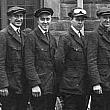James L. Moran, First Police Chief
Born in Detroit, January 23, 1832, James Louis Moran was the third child in a family of thirteen whose parents were Louis and Maria (May) Moran. The Moran family were related to the Campaus. Louis Campau’s mother was Marie Therese Moran, and the father of Louis Moran (grandfather of James) was married to Catherine Campau.
When he was five years of age James Moran came with his parents from Detroit to Grand Rapids. They traveled the entire distance on Indian ponies, guided by Indians and followed an Indian trail. They camped in the woods at night and after a journey of eight days reached their destination. After about two months the family moved to Middleville and settled among a tribe of Chippewa Indians, the village consisted of 140 lodges. There they remained four years.
They returned to Grand Rapids in 1841 and rented the old Eagle Hotel. Here James remained until he reached the age of 15 when he engaged as deck hand on one of the old steamers on the Grand River. He acted in this capacity for about six years and then engaged as a pilot on the of the boats of the Grand Rapids transportation Company receiving the highest salary ever paid to any pilot in this section of the state. After two years, during which time he served the company’s interests faithfully, he bought a one-third interest in one of the steamers known as the “Nebraska” and filled the position of captain and pilot for about three years. At that time due to the reduction in river traffic because of the railroads and the stringency of the money market he lost all he had invested.
In 1853 he was married to Elizabeth Ann Robbins of Boston who came to Grand Rapids in 1838 with her father, John Robbins. In the fall of 1862 he was appointed ensign on board the gunboat, “Lafayette,” the iron-clad ram steamer which belonged to the Mississippi squadron under Admiral Porter, the executive office being Captain William Walke.
After about eleven months of service he was called home by a dispatch stating that his parents were both dangerously ill. Receiving the consent of Admiral Porter he immediately started for his home and on arriving home found both his father and mother stricken with paralysis and so seriously affected as to require his entire attention. After the lapse of six years of suffering, death relieved them. By the death of his father he fell heir to considerable property in the city of Detroit that he exchanged for valuable property in this city.
In 1871 he organized the first police force in this city, of which he was made chief by the city council. He held this position until 1879. He returned to his position for another year in 1881. He then retired but was made chief detective by the board of fire and police commissioners, May 24, 1884 and retained the office until his death. He was considered one of the keenest detectives in the country, and was a terror to criminals.
His personal appearance was prepossessing. He was squarely built, six feet one inch in height, and weighted about 225 pounds. His eyes were dark and his hair coal black dashed with gray. He never took a prominent part in politics. He was a man of strong sense and much decision of character. Moran suffered from a long and painful illness prior to his death. He left a widow, who died in 1915, and one son, Charles Louis, who died just two month after his father. Members of the Moran family are buried in St. Andrews Cemetery.
Compiled from:
Grand Rapids Eagle, 3/10/1886
Evening Democrat, 3/10/1886
Grand Rapids Times, 3/11/1886

 facebook
facebook





